The corduroy suit

I have a friend who wears what he calls ‘knockabout’ suits.
How exactly he knocks about in them I don’t know, but the meaning is clear: these are casual suits, that don’t belong in a formal environment like an office.
Most non-worsted suitings can exist in this category: woollens like flannel, linens, and of course all the different types of cotton.
One of my favourites, and one that is particularly hard to get right, is corduroy.
Pictured is my tan-corduroy suit from Anderson & Sheppard, worn at our book signing in Leather Foot, Toronto earlier in the year.
Corduroy, like most cottons, immediately feels more casual than flannel or linen. It cannot hold a crease; it is soft and malleable; and it reminds us of the comfort in a cotton T-shirt, chinos or jeans.
Actually, comfort is an interesting point here - for it can mean different things to different people.
Jeans are comfortable because they warm and mould with the body, giving a feeling of reassurance and structure. This is very different to the comfort of a tracksuit or loose linen trousers, where the aim is to feel like you’re wearing nothing at all.
Arguments over whether jeans are comfortable, unfortunately, never get round to defining their terms - remaining at the level of anger and anecdote.
But back to corduroy. The thing that makes cotton reassuring is also its most limiting factor in tailoring - it does not stretch.
In trousers this is often mitigated with the addition of elastane (which rarely works out well) but in tailoring, a little wool or cashmere is often added - both to add that touch of natural stretch and to give it softness.
My suit here is made in a Zegna cashmere/cotton corduroy (10% cashmere) and others such as Scabal offer something similar. This feels great, although it does make the trousers bag even more than regular cords.
I enquired with Scabal whether it was possible to use pure cotton for the trousers and a cotton/cash mix for the jacket, as this would seem to be the best of both worlds.
But apparently the differences in the way cotton and wool take dye would mean that the two cloths could never be close enough in colour to be indistinguishable.
From a style point of view cord works well as a ‘knockabout’ suit because it immediately looks relaxed and casual - helped by its mostly casual colours.
A reader made the insightful comment a while ago that this suit was perhaps an example of the more casual direction of menswear. I agree, and can only hope that men realise the style and beauty of such tailoring, rather than descending all the way to tracksuits and trainers.
The challenge with styling corduroy is to avoid its rather old-fashioned connotations. As another reader asked recently, ‘can you suggest a way to wear cords without appearing too ‘fogey’?’.
In a suit, even a regular single-breasted one, this is relatively easy.
It’s harder in separate trousers or a jacket, but I would suggest a cut that is as slim as tolerable, and then working with other items around the cords.
So avoid a tattersall shirt, chunky shoes and a pheasant-decorated silk tie, in favour of perhaps (as here) a denim shirt, slim shoes and grey cashmere neckwear.
Lastly, the make and style of this Anderson & Sheppard tailoring.
As regular readers will know, I love the style of the A&S double-breasted - the chest it gives me with the drape cut, plus the belly on the lapel.
But, much as I love this suit, the make is probably too formal for the versatile piece I wanted.
The height and structure of the collar means that it really only works with a tie; when the shirt is open-necked, it will too easily collapse beneath the jacket collar.
(And this is with the button-down shirt style that Luca Avitabile and I specifically designed to stay up when unbuttoned.)
All English jackets are like this, and for the use that I wanted I should really have used an Italian tailor, most likely Neapolitan.
But we live and learn. I may yet get to make something similar in a Neapolitan cut, and in the meantime it is interesting how much I have come to love this suit, despite its flaw.







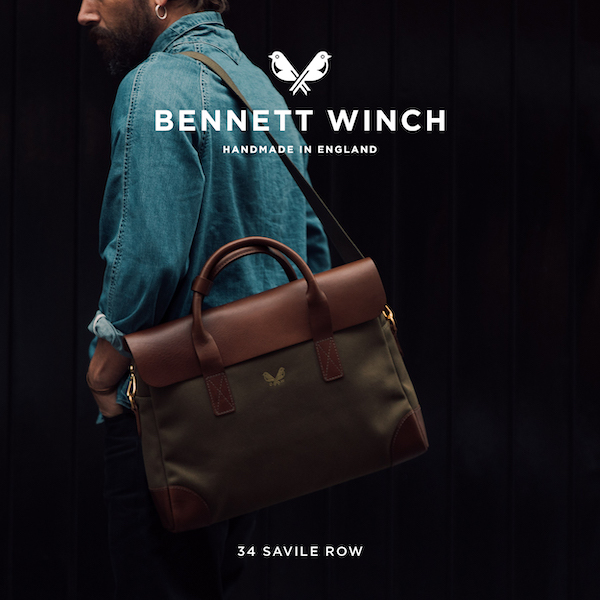







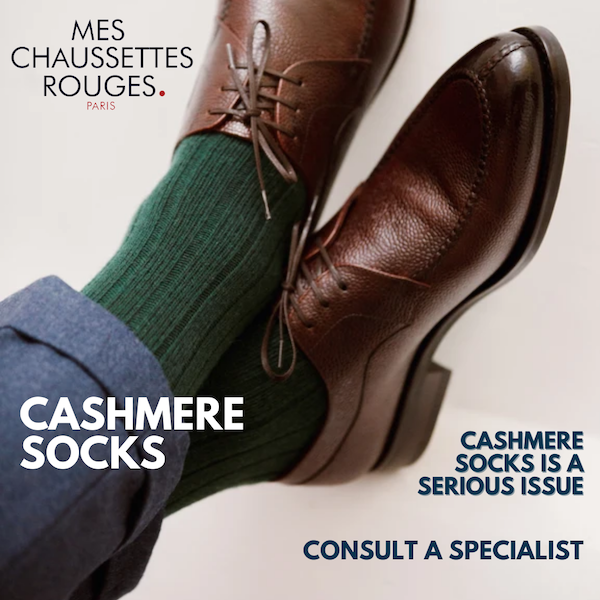










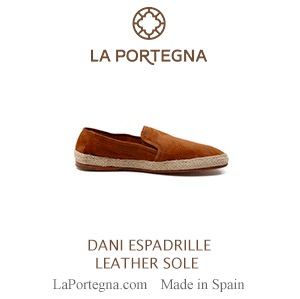
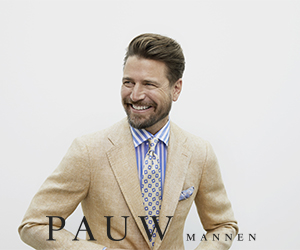



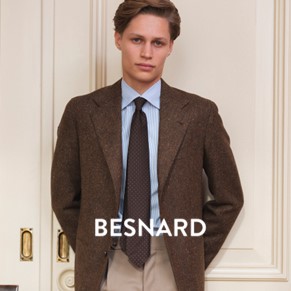
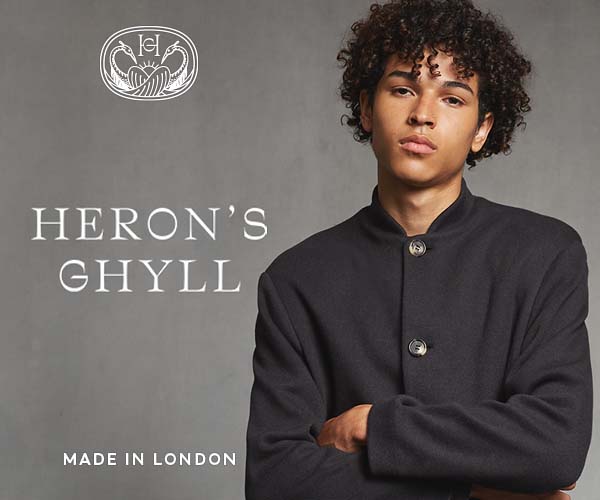

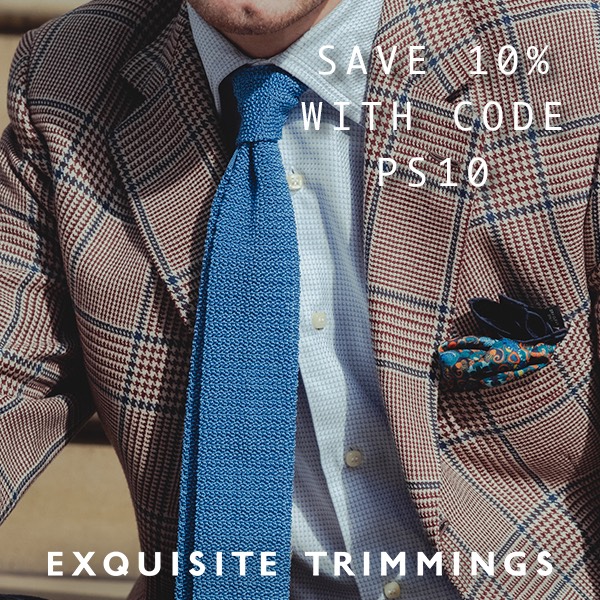
This relatively formal treatment of an essentially casual cloth is interesting; the jacket style in particular does look great (I love that contrast with the grey, woollen tie). The tan colour is excellent, love that tone. I don’t wear suits so anything like this would not be for me but in terms of separates I think corduroy is a fantastic fabric – immediately you have a contrast in texture, weight etc and to me it creates that bridge of clothing between the purely casual and more formal. Agree about the “fogey” connotation though, too easy to lapse into the “country”, Sunday Paper advertisement style. I notice the excellent Trunk have some corduroy trousers and jackets.
Great read as usual Simon! I’d always been hoping for this article, probably because this is my favorite of all your suits, barring perhaps the Edward Sexton flannel. Maybe one day I’ll have something like this!
I still don’t understand the obsessive fear of appearing “fogey”. Casual suits started out as country wear, and gingham shirts and sporting themed neckties are their natural complement. I, for one, would take traditional British country wear over the Pitti peacocks with their purple jackets, too short trousers, and loafers with no socks any day. I ask you, does this look like a “fogey”? http://www.bondsuits.com/wp-content/uploads/2014/11/Goldfinger-Hacking-Jacket.jpg
So would I Dan, but then my opinion of those peacocks is even lower.
The Bond image does not look that ‘fogey’ no, but those are pretty muted, urban colours
Bond was, in that clip, about to go out for a game of golf with Auric Goldfinger, hence the nod to “countryside”.
True, but my point is that Connery looks confident and masculine in his very British hacking jacket, cavalry twill trousers and knit tie; there is nothing “old fogeysh” about him, in spite of the bad rap an outfit like that would have on some blogs (not necessarily Simon’s blog, of course).
Simon, maybe the stuff of other blogs, but I’d love to hear what you think of Connery’s Bond in terms of style
You’re probably right, but I’ll keep it in mind for a possible piece. Thanks for the suggestion
Dan,
All clothing carries connotations to a greater or lesser extent. ‘Traditional British country wear’ as you describe it does, for a great many people, carry the connotation of being worn the rich and upper class. We can decry them as much as we want, but these connotations exist, and it’s worth being aware of them so that one can either embrace them, subvert them or avoid them depending on what one want to achieve from an outfit.
What if one just happens to like the outfit? Must everything be reduced to a social/political statement? Part of the charm of Connery’s Bond was that here was this rough, muscular, working-class Scotsman adopting the dress and manner of an English gentleman even though he clearly was NOT “to the manor born”.
If you like it wear it! The point is that Connery’s Bond is not blind to the connotations, he is playing with them, still sending a message but just not quite the one such clothes normally do .
Simons often talks about having to know the sartorial ‘rules’ in order to break them. I’m making a similar point; knowing the traditional connotations better equips one not to be bound by them.
Hadn’t spotted the article with this suit, but I have to say I cannot understand corduroy being used for a DB suit at all. It is perhaps the most informal of fabrics (in the same vein as moleskin) being used in pretty much the most formal of coat styles. Not for me I’m afraid.
Interesting to read the various reactions (including Mr Crompton’s) to the apparent incongruity of a fairly formal cut and a very informal fabric. In my opinion, on a slim frame that double-breasted works really well precisely because an fairly ‘sloppy’ fabric works so well with a ‘sharp’ cut.
Clearly it’s not going to be an everyday garment or anyone’s sensible first commission but within an expansive wardrobe it could have a place. I agree that, for that specific suit, the “Cordings/country” accessories would not work, much as one might like them in different settings.
Hi Simon, I like this suit and the way you wear it. Could you please talk about the buttonhole choice? I prefer a buttonhole on one lapel only although I see a lot of double breasted jackets like yours with two. What is the motivation for this? Is it just for style/balance/symmetry as no one ever wears two buttonhole flowers (one in each lapel) and if you wear bespoke why would you not decide which side you want to wear your buttonhole and have it placed on that lapel. I am pretty sure this is one of those ‘no right answer’ questions, but I’d like to know your thoughts nonetheless – particularly as the buttonhole is one of the most prominent features on a jacket.
There’s certainly no right answer. And much as I like wearing a buttonhole, I rarely do so, so this isn’t much of a factor.
I simply like it from a balance point of view, but there it doesn’t admit of that much in-depth reasoning.
I assume a key feature of a “knockabout” suit is the lack of structure , particularly in the jacket.
Essentially what attracted men to Armani suits.
As for RTW casual / knockabout suit where would you direct the sartorial gentleman ? Boglioli ? Caruso ?
Most Neapolitan brands -stile latino, attolini etc
Hi Simon,
I grearly appreciate seeing guys wearing well tailored corduroy suits. And yet surprisingly enough, I am not at all a fan of these suits, no matter their styles when it’s about myself having to wear them. And yet I absolutly love corduroy trousers!
However what I really find challenging is how to spot the right fabric. The one that starts being stiff and then slowly becoming very soft with wear. Apparently, even knowing that a great deal of wales isn’t enough!
Before devoting a piece on this specific topic, perhaps a few lines of advice could already be very helpful to many of your readers.
Many thanks in advance.
John
Quite the Professor of Geography look here! You’re too young to wear this.
I can see why you’d say that, but I think it doesn’t look old for the same reasons in regard to a ‘fogey’ look as discussed
There are no patches on the sleeves! And a geography teacher wouldn’t have the imagination to wear a DB…
I really like the one Robert Redford wears in All the Presidents Men:
http://emanuellevy.com/wp-content/uploads/2013/11/all_the_presidents_men_redford_5.jpg
The way he wears it is very casual, but it doesn’t really call attention to itself too much. I wonder if Redford’s stature helps with that though, I don’t think Dustin Hoffman would look the same with cords.
Actually, the mens suits in that entire movie are a great snapshot of various styles of the time.
Yes, as with a lot of things it helps (in order) being: the hero; good looking; slim; tall. But it does help that it is worn in a casual manner as well
Simon,
Interesting post as always.
I’m interested in your view on the A&S drape cut, which is something I’ve never understood.
If it creates a full chest where the wearer doesn’t have one, surely there is excess cloth and the jacket looks too big, because there is isn’t enough chest to fill it? For example, and I know photos don’t do justice to the fluidity of suits, in the photos above the jacket looks too big to me. Perhaps I just prefer a trimmer cut, but surely the suit should fit the wearer, and can’t create realistic volume where that volume doesn’t exist because the cloth only has a certain thickness to it?
The fullness is created and held by the hand-padded chest canvas – the structure you can create here is one the key aspects of bespoke tailoring.
There is often a little bit of excess at the sides of the chest and the back, but it is rarely noticeable.
Also, there is a lot you can do with drape, tension and stretching of cloth regardless of the structure underneath. The sleeves and the skirt do not collapse and look lifeless either, after all, even though there is excess material there.
Hi Simon,
I love the suit but, outside of a signing for one’s book on menswear, or attending a menswear fashion show, or for posing for photographs on a menswear blog, when could someone wear such a suit?
Like some other suits, it can actually do triple duty. So yes, it’s rather dandy all together, but I also wear the jacket and the trousers separately – and they’re much less unusual!
Interesting. How do you wear the jacket as a separate Simon?
As mentioned higher up, with an open-neck shirt I can get to work with the A&S collar. (Eg blue poplin or denim). And then usually grey trousers – Crispaire say. You want something with a sharp line to contrast with the sloppiness above the waist
Hi Simon,
Would you wear your DB alone with jeans?
Not in this make, no. In a Neapolitan one with a very natural shoulder, probably
Love the corduroy and he knockabout suit idea. Two thoughts.
I find a DB suit and corduroy contradictory, a DB style is already a little unusual in it self and a little more formal than single breasted, mixing it with an unusual and casual material does not quite work.
Knockabout suits suggest something you can wear a little rougher and get a little dirtier. But I find that materials like cotton and corduroy less resistant and stain more easily than a heavy wool. Having a knockabout suit that you need to be more careful in or that you need to send out to clean more often seems contradictory. So the idea is great but maybe a heavy wool (tweed?) would be a better functional match? alhough again a risk of looking old fogey.
Simon your thoughts
I know what you mean on both points. I like the style of contrasting casual cloth and formal style, though as pointed out above it does make it more dandy and less versatile. And on knockabout, I wouldn’t plan to do anything that was actually rough or dirty, so shouldn’t be a problem. Though you’re right, tweed would be a lot hardier
I love this suit and think it’s one of Simon’s finest pieces.
The point about the scourge of the collapsing shirt collar has to be watched when sporting an A&S with an open neck albeit I’ve found that the ‘Friday Polo’ and Dunhill flannel button downs are the answer.
The question of wether or not our Italian brethren would do a better job with corduroy is an interesting one and something I’ve often considered.
My concern would be the lack of drape which gives a wonderful louche look whilst making the suit incredibly comfortable and great to move in – the two principle advantages of the drape in my not so humble opinion.
I have a couple of single breasted A&S in cord and I practically live in them.
Of course, they aren’t for formal professions but happily I don’t have that restriction and when one looks at the Redford shot or practically any Ferry photo it is easy to see how achingly cool they can look.
It would be great if Simon would commission a couple of single breasted cashco or needle cord – perhaps one from his favourite Italian and one from C&M to see what sort of job they would make of it ?
That would be fascinating.
Great articles,
question : How should I advise my tailor compare to my regular wool trousers ?
any differences in the cut and such ?
Perhaps a little more room in the leg, that’s all
(Nothing personal and said with a smile )
No !
Corduroy !
Lapels too wide !
Sloping shoulders that need padding up !
Too much drape on chest !
The colour !
I can’t see what’s to like .
I notice you like the A&S drape but it makes your chest look wider . Even more so in a double breasted .
And surely those shoulders need disguising .
P.S. Ironically I can only say these things having learnt so much from reading your blog !
Taken with a smile too Rabster. And disagreement throughout!
Everything is the answer albeit it will never appeal to those that strive for a trussed up look.
Each to their own.
I agree with the former critc, I’m afraid. Albeit loving the silhouette of A&Ss’ suits – specifically their DBs – for me there would simply be to much fabric at the chest – the drape, the DB lapels, the light-catching structure of the corduroy and its tendancy to crease and lock “sloppy” – I would feel like being wrapped in a thick blanket rather than dressed up. But I’m quite interested in how you regularly combine the suit? It seems to me to be quite a challenge – as you described – when you feel limited to a tie-combination.
I’d pretty much always wear a suit with a tie, and this works with most navy, grey and green ties. When I wear the jacket on its own I often wear a shirt open-necked but there are only one or two shirts that are tall enough to work, or a crew neck sweater underneath gives the collar enough support as well
Thanks for this article Simon as I have something similar in SB. The cloth is 100% Italian cord – super soft and drapes well, this article adresses how to wear in a modern way. Looking back to your A&S check DB (2014) you show how layered wear can also add modernity and style. As a ‘knockaround’ it would also match a lightweight polo or high crew neck jumper. Paul Martin (BBC Flog It) has cord with a modern twist in light blue whilst Kevin McLeod (Grand Designs), looking for a robust, yet semi-formal suit, had one made in slim cut Harris Tweed…robust for site wear yet adaptable enough for meetings. You have used blue/grey do you have any other suggestions for cord colour combinations (thinking perhaps dark olive,bronze,black,cream or navy)? Would you take it down an ‘urban’ path and mix it with a troyer collar jersey, light gilet or wool hoodie?
Hi. Hoodie no, gilet only if it was slim and dressy enough (the vast majority aren’t).
I’m not sure if you’re asking for colours of cords to wear, or colours of things to go with the cords (and in which case, just this tan colour?)
Hi Simon
Whilst I’m not adventurous enough to go for this kind of thing I must disagree with some of the previous people and say that it’s a great look and pretty much perfect for what it is. As you’ve may have mentioned somewhere I think a neapolitan make such as the Caliendo hopsack DB would have taken this to an altogether better place, don’t you think?
Yes Mac, as indeed I say at the end of the piece
I like the formal style with the less formal fabric approach. Can’t say you have brought the same imagination to your socks – grey…not working for me. Do you remember what shoes you wore with this?
They’re actually dark green…
And the shoes were my Saint Crispin’s:
https://www.permanentstyle.com/2016/05/saint-crispins-shoes-review.html
My apologies, dark green is good, shows how colours can be deceptive in photographs. Lovely shoes.
The knockabout suit is a great idea, particularly in the Neapolitan cut, worn with your Friday polos. I wonder what other colors in corduroy could work in your opinion; and what are other suitable fabrics for knockabout suits?
Other cottons would be my first choice – particularly heavier ones (eg my Caraceni jacket post). Then heavier wools/tweeds. Just need a tweed with a dense enough weave to work in trousers
What other colors do you think could work for a corduroy knockabout suit?
Olive certainly, and perhaps brown – though brown corduroy often isn’t deep enough in colour
By coincidence, I have a corduroy suit in the works that should be finished in a couple of weeks. I went for a three piece (SB) to give maximum flexibility with the various combinations of wear (and with a nod to Wes Anderson). Mine is from Meyer & Mortimer though so more structured.
Sorry, I wasn’t clear…I meant what colours might go with brown cord, hence the list. I guess I’m looking for something to give it some ‘pop’ whilst not overpowering it, or taking it back to the country look. Considering all things if you commissioned another cord suit (same DB) what alternative colour might you consider?
I’d probably go for olive.
For things to wear with brown cord, I’d try to make it more urban and muted – so blues and greys
I probably already know the answer here but I’m still curious to hear your take; I have a couple of lovely drape-cut odd jackets from Steven Hitchcock. Sadly they get very little wear for the same reason you mentioned in this post (collar works best with a tie, more formal style doesn’t go so well with casual trousers, etc.) Having seen some of Mr Dirnelli’s “extreme alterations” on Tumblr, I wondered if you would ever consider trying to make a jacket more casual by, for example, replacing roped shoulders with a shirt sleeve. Would a more casual shoulder even work with a drape cut or is the whole thing likely to be a disaster?
It wouldn’t be as bad as trying to change the collar (where the major problem is) and is certainly possible even with a drape cut. But I think you’d have to be prepared to maybe lose the jacket in this process. Easier with cheaper RTW!
I tip my hat to your sense of adventure Simon….
“THE CORDUROY SUIT”
Would be a punch line in 95% of the time as it relates to mens’ sartorial journals….
On a different note, is there room for more coverage of clothing made with more patterned fabric, (richly coloured paisley jacquard etc.) along the lines of a “ETRO” only at a bespoke level?
Do you think the look would have “legs/longevity” or look ridiculously dated a few years after purchase?
I think the latter unfortunately. And mills are conservative at the best of times – you’d struggle to convince them to offer it
Simon,
If you had to pick ONE Italian bespoke house to cut you a cord suit.
Who would it be and would they have access to Zegna and Loro Piana cloths ?
Regards,
David
Caliendo probably, and yes
Simon,
Points to you on having something made, which for most people would be considered almost a punchline – CORDUROY SUIT!
Question : it has been decades (and about two feet in height) since I have had anything in corduroy – mostly since my recollection is that after a little wear, or in fact a good washing, the sheen is gone, and all too quickly bare spots appear. I don’t think I can name a fabric that degrades so quickly from the qualities that initially attracted one to it..Has quality improved significantly?
Now I don’t expect you to stress the garment in a playground (my last recollection of the fabric), but how do you see it to wearing, and holding up to some cleaning?
You’re completely right, it’s not going to wear as well as pretty much any other cloth. Of course, cotton is nice in this way, its ageing is part of the beauty, but nicer in a plain cotton that fades slightly rather than a cord where the wales rub off.
To that extent it is an indulgence, and perhaps for the 6th or 7th suit in the wardrobe. But I’m actually looking forward to that wear showing through (and patching the elbows!)
Ooops..
Didn’t check to see my prior comment made it!
My question on wear and tear still stands though!
Hi Mr Crompton,
I’m writing from Angola, and i would like to know in which circumstances a trouser with cuffs should be avoided.
In general, on a more formal outfit like a business suit. Cuffs tend to be more casual.
I just returned from a business/social where a representative of a major high-end retailer here in Toronto maintained (against me) that the era of the corduroy suit is dead and buried. I hope he’s wrong. I seem to belong to that small minority of people who continue to like the corduroy suit. Not all corduroy is the same. And in the hands of the right tailor, I believe it can still deliver a versatile yet sufficiently dressed up look for most occasions. (also useful, of course. as survival-wear for our harsh Canadian winters)
Simon the fit on this one is off and I just cannot see the rationale of a DB with large peak lapels in this material and color.
Thanks Mateo. Always good to have more substantial points if you can – eg what you mean by being ‘off’, as that could be style or functional mistake etc. Equally, I’m sure people would be interested to hear why you think a DB with large lapels isn’t suited to cord.
I’d agree most of the time, but I liked the contrast here of casual/ordinary and striking/unusual, and good to have your views too.
Largely inspired by this post, I ordered a db corduroy bespoke from Jonathan Quearney in dark green (cloth 470g, from Brisbane Moss). Jonathan has made me loads of fantastic garments over the years but I think this piece is outstanding. Like Simon, I am surprised by how much I love this suit. A couple of reflections, following the comments:
1. It is incredibly versatile. I picked it up a week ago. Since then, I have worn: (1) whole suit, to a school function, (2) just the trousers, to the pub with a jumper and scarf, and (3) just the jacket, with jeans and boots, to meet a friend for coffee. All worked perfectly. Truly, a three-way suit.
2. This is a “statement” suit. People notice. Everywhere. People comment. I’m not sure if it’s the db, or the corduroy or the green – or all three – but this is not a suit for those who want to blend in.
Wonderful to hear, thanks Matthew. So lovely to know readers take on my recommendations, and have a similar experience!
I am looking at getting a corduroy suit made in a dark chestnut brown for winter. If I do it will be my second piece of commissioned clothing (the first being a pair of trousers I am still waiting on). Of course this flies in the face of all conventional advice however I have the luxury of working in an office (not to mention a country) where dress codes are very wide and extremely lax. I’m happy with a few altered ready to wear options for my plainer (“job interview”) sort of pieces. In fact the least versatile thing I could purchase for my lifestyle would be a very traditional suit that would only make sense worn with a tie.
Things like this are fantastic as they promote the beauty and excitement of custom made tailoring to those who simply don’t have the cause to wear more traditional suits.
Thanks, that’s nice to hear
Hi Simon. Hope all is well. Would W&S be a good choice for a corduroy suit, or is their house style too structured/formal? Aside from Neapolitan tailors, would Sartoria Passinato or Sartoria Vergallo be good choices? They are probably not as soft in structure as the Neapolitan style, but would their house styles be soft enough that they would look good with a corduroy suit?
W&S would be a bit more formal, yes – fine to wear the jacket with flannels, for instance, but less so with jeans.
Of the others, Vergallo would be good and yes could be very soft
Do you think Passinato would be a bad choice for a corduroy suit, suitable to be worn without a tie? I am considering exactly that. Would you consider Vergallo to be better at executing a “soft” suit?
I’ve only tried one thing from Pasinato, but on my experience, yes Vergallo might do a better soft suit. Bear in mind it won’t be the same style as a Neapolitan one though
Thanks very much for the super quick reply – that is helpful!
Hi Simon,
Since you just wrote about your cream Pommella cords, I thought I’d ask a bit here on corduroy. You mention that adding cashmere to the mix will tend to make the trousers bag even more. I have found corduroy bags more than pretty much all other cotton trousers. Do you have any tips on mills or books with sturdier cord that won’t bag as much, or should one just accept it as part of the charm of corduroy?
Heavier cords will generally bag less – and people like Brisbane Moss do a big range of weights. Also helps if they’re not cut too slim
Great article my friend,
What would you recommend on pleating a corduroy trouser? I’m getting a suit made and I’ve heard that it’s not best to pleat a corduroy.
I prefer pleats for the aesthetic and the function.
Yes, pleating most cotton trousers is hard, as they’re likely to lose their shape quickly – cotton rarely has the same sharpness as wool.
I’d recommend avoiding it, or at the least make sure the tailor has some ways to mitigate the effect, such as a deeper pleat
Hi Simon. Hope all is well. For a corduroy suit, is it better to wear a silk knitted tie or a wool knitted tie? Or both work? Same would apply for a tweed jacket and flannel trouser combo?
Both can work – the silk marginally smarter
Hi Simon. Thanks for the reply. Just one follow-up question. Regarding tie widths and lapel widths. Most knitted ties I see are somewhat narrower (6.5 to 6.75 cm) than the lapel widths I have on my suits (8 cm and over). So how does the “rule” about matching tie and lapel widths work when wearing knit ties?
Ignore it. It’s a vague guideline at best, and even then sometimes contrast between the two can be a good look
Hi, Simon. I saw this suit in your last video with Aleks. Lapels on this suit looks perfect for me. Do you remember width of them? I didn’t find any style breakdown on this jacket on your website.
Hi Astemir,
The proportions are the same as the double-breasted Anderson & Sheppard jacket in this post.
Resurrecting this thread. I’ve just bought a single breasted tan corduroy jacket with patch pockets. Do you think this will work with light denim Levi’s jeans and a Friday polo? Also what are your thoughts about wearing it with light grey trousers (if yes which fabric)? Your thoughts would be much appreciated
Whether it will work will depend on the structure and make of the jacket. The material should be fine, but if it’s a more structured or sharp style, it won’t.
I would wear a softly made jacket like that with grey flannels, yes
Thanks Simon – yes it’s an unstructured Neapolitan jacket. I am particularly looking forward to wearing it with light grey flannel trousers, but wasn’t sure how well it would work, so your advice is reassuring.
Hi Simon, I am not so far deep into the area of Corduroy. But so far for my research, I have found multiple corduroy fabric, say at the same 8-10 wales, pricing at a very different price. Branding must be a huge impact in pricing, of course. I was wondering if there is any additional way, information to differentiate a relatively cheap cord fabric from a more high-end luxury one? This be a future topic, possibly?
Well, it’s sometimes hard to tell, but if they’re all 100% cotton, then it will mostly be branding. There are definitely finer cottons, and therefore finer corduroys, but that’s not even necessarily what you want – it will just look a bit more luxurious
I’m planning to have my first corduroy suit for this winter. Considering opt for olive or brown.Probably go for olive depends on your article.Single breasted is the safe choice,but I’m fascinated by your beautiful DB suit.It’s hard to make a decision.
And I also get some problem about the weight of fabric,my tailor show me the corduroy fabrics in 430gram.I worry that it would be too heavy.
I would probably go green, single breasted and a lighter weight
Hi Simon, do you think 13oz mid-wale corduroy cloth could be warm for a safari jacket during the winter months?
Many thanks,
Jack
No, in the UK at least that would be nice in winter – you might want a size you could layer under things too
Great, thanks, Simon.